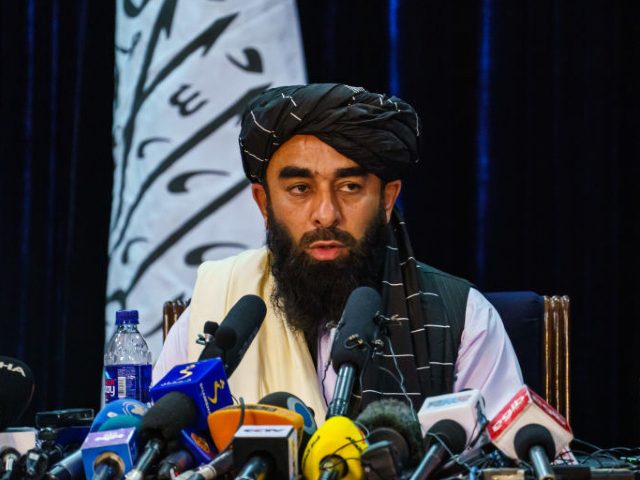Top Taliban spokesman Zabihullah Mujahid condemned the U.S. State Department on Sunday for publishing a religious freedom report on Afghanistan which revealed the repression of minorities of faith in the country.
As a jihadist terrorist group, the Taliban announced after seizing control of the country in August 2021 that it would enforce sharia, or Islamic law, at a national level. In order to do so, it replaced the Afghan government’s Women’s Ministry with the “Ministry for the Promotion of Virtue and Prevention of Vice,” a government agency tasked with harassing people for, among other things, not properly maintaining their beards or letting “their” women show their faces in public.
Afghanistan’s population is overwhelmingly Muslim, but the small number of Christians, Hindus, and Sikhs – as well as Muslim minorities like Shia and Ahmadiyya Muslims – face extreme discrimination and live in fear of Taliban jihadists attempting to punish them for insufficiently following the terrorist group’s interpretation of sharia, the State Department revealed last week in its annual global religious freedom report.
Mujahid, the Taliban spokesman, vehemently denied the facts in the report.
“The religious and civil rights of all minorities in Afghanistan are protected,” Mujahid wrote in a statement published in English on Twitter. “In this regard, the State Department’s report is incomplete and based on false information … we reject the State Dept. report.”
Notably, Mujahid listed Sunni and Shiite Muslims, Sikhs, and Hindus as “freely” practicing their religion in Afghanistan, omitting Christians, Baha’is, and other religions.
The Taliban’s return to power occurred after President Joe Biden broke an agreement with the terrorists approved by predecessor Donald Trump that would have seen American forces out of Afghanistan in May 2021, ending the 20 years of U.S.-backed-government controlling Kabul. Biden extended the war, initially claiming American forces would leave in September. Biden’s announcement prompted the Taliban to launch a national campaign to retake power that resulted in massive, and largely bloodless, conquests and brought Taliban leaders to Kabul’s city limits. On August 15, then-President Ashraf Ghani fled in a cash-filled helicopter and remains in exile in the United Arab Emirates at press time.
Ghani’s government was Islamist, as is the Taliban’s regime, and Afghanistan was deeply inhospitable to Christians and other religious minorities prior to the Taliban’s return. International religious aid groups and governments like America’s expressed severe concern that the Taliban would greatly exacerbate persecution already ongoing in the country.
“According to international sources, Baha’is and Christians continued to live in constant fear of exposure and were reluctant to reveal their religious identities to anyone,” the State Department’s International Religious Freedom report, which covers all of 2021, read. “Christian groups reported public sentiment, as expressed in social media and elsewhere, remained hostile towards converts and to Christian proselytization. They said individuals who converted to or were studying Christianity reported receiving threats, including death threats, from family members.”
“Christians and Ahmadiyya Muslims reported they continued to worship only privately and in small groups, at home or in nondescript places of worship, to avoid discrimination and persecution,” the report observed.
The report went on to note that the Taliban’s return, “combined with statements from some Taliban leaders starting in August reserving the right to enforce harsh punishments for violations of the group’s strict interpretation of sharia,” particularly concerned Christians who had converted from Islam, fearing punishment for “apostasy,” a crime in some Islamic countries.
According to the State Department, non-Muslim religious groups in Afghanistan “together constitute less than 0.3 percent of the population.” Afghanistan is about 85 percent Sunni Muslim.
Mujahid’s condemnation of documented religious freedom problems appears to be a continuation of the Taliban’s propaganda campaign rebranding the murderous jihadist group as an “inclusive” government. Mujahid personally debuted the new public image during his first press conference following the Taliban’s return to power in August.
“Our countrymen and women who have been waiting, I would like to assure that after consultations that are going to be completed very soon, we will be witnessing the formation of a strong Islamic and inclusive government, Inshallah,” Mujahid told reporters at the time. “We will do our most to make sure that everybody is included in the country, even those people against us in the past, so we are going to wait until those announcements are made.”
“Nobody should be left out, or any anybody with interests to serve the nation, they’re not going to be ignored. So the future government will be inclusive,” he insisted.
Other Taliban spokesmen and officials have similarly repeated the mantra of creating an “inclusive” government while implementing increasingly strict sharia guidelines, most prominently banning women from leaving their homes without an emergency requiring it.
The Christian aid organization Open Doors, which publishes an annual World Watch List of the most dangerous places in the world to be a Christian, ranked Afghanistan at the top of its list for the first time in 20 years this year, citing the Taliban’s return to power. North Korea had held the spot for years and fell to number two, even as it increased repression against Christians, because the dangers from the return of the Taliban in Afghanistan outpaced the growth of persecution in North Korea.
The group describes being Christian safely in Afghanistan as “impossible.”
“If a Christian’s new faith is discovered, their family, clan or tribe has to save its honor by disowning the believer, or even killing them. This is widely considered to be justice,” the Open Doors report narrated. “Alternatively, since leaving Islam is considered a sign of insanity, a Christian who has converted from Islam may be forcibly sectioned in a psychiatric hospital.”

COMMENTS
Please let us know if you're having issues with commenting.